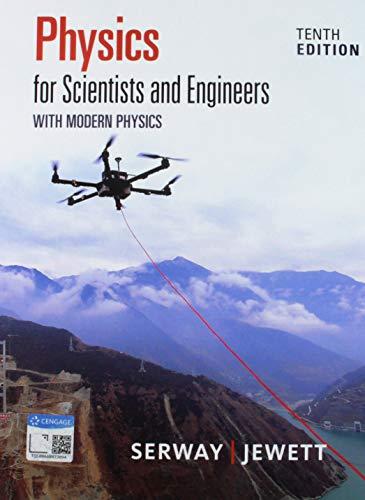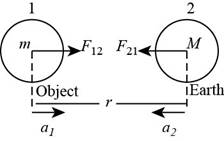
(a)
To determine: The magnitude of the relative acceleration as a function of
(a)
Answer to Problem 41AP
Answer: The magnitude of the relative acceleration as a function of
Explanation of Solution
Explanation:
Given information:
A object of mass

Figure I
Formula to calculate the relative acceleration is,
Formula to calculate the gravitational force exerted by the object on the Earth is,
By Newton’s law the force exerted by the object is,
From equation (II) and equation (III) is,
The forces
Substitute
By Newton’s law the force exerted by the Earth is,
From equation (IV) and equation (V) is,
Substitute
Substitute
Conclusion:
Therefore, the magnitude of the relative acceleration as a function of
(b)
To determine: The magnitude of the relative acceleration for
(b)
Answer to Problem 41AP
Answer: The magnitude of the relative acceleration for
Explanation of Solution
Explanation:
Given information:
A object of mass
From equation (VI) the relative acceleration is,
Substitute
Conclusion:
Therefore, the magnitude of the relative acceleration for
(c)
To determine: The magnitude of the relative acceleration for
(c)
Answer to Problem 41AP
Answer: The magnitude of the relative acceleration for
Explanation of Solution
Explanation:
Given information:
A object of mass
From equation (VI) the relative acceleration is,
Substitute
Conclusion:
Therefore, the magnitude of the relative acceleration for
(d)
To determine: The magnitude of the relative acceleration for
(d)
Answer to Problem 41AP
Answer: The magnitude of the relative acceleration for
Explanation of Solution
Explanation:
Given information:
A object of mass
From equation (VI) the relative acceleration is,
Substitute
Conclusion:
Therefore, the magnitude of the relative acceleration for
(e)
To determine: The pattern of variation of relative acceleration with
(e)
Answer to Problem 41AP
Answer: The relative acceleration is directly proportional to the mass
Explanation of Solution
Explanation:
Given information:
A object of mass
From equation (VI) the relative acceleration is,
This is the linear equation and shows the relative acceleration is directly proportional to the object having mass
Conclusion:
Therefore, the relative acceleration is directly proportional to the object having mass
Want to see more full solutions like this?
Chapter 13 Solutions
Bundle: Physics For Scientists And Engineers With Modern Physics, 10th + Webassign Printed Access Card For Serway/jewett's Physics For Scientists And Engineers, 10th, Multi-term
- Point charges q1 = 50 µC and q2 = −25 µC are placed 1.0 m apart. What is the magnitude of the force on a third charge q3 = 40 µC placed midway between q1 and q2? (The prefix µ =10−6 C.)arrow_forwardThe de-excitation of a state occurs by competing emission and relaxation processes. If the relaxation mechanisms are very effective:a) the emission of radiation is largeb) the emission of radiation is smallc) the emission occurs at a shorter wavelengthd) the de-excitation occurs only by emission processesarrow_forwardm C A block of mass m slides down a ramp of height hand collides with an identical block that is initially at rest. The two blocks stick together and travel around a loop of radius R without losing contact with the track. Point A is at the top of the loop, point B is at the end of a horizon- tal diameter, and point C is at the bottom of the loop, as shown in the figure above. Assume that friction between the track and blocks is negligible. (a) The dots below represent the two connected blocks at points A, B, and C. Draw free-body dia- grams showing and labeling the forces (not com ponents) exerted on the blocks at each position. Draw the relative lengths of all vectors to reflect the relative magnitude of the forces. Point A Point B Point C (b) For each of the following, derive an expression in terms of m, h, R, and fundamental constants. i. The speed of moving block at the bottom of the ramp, just before it contacts the stationary block ii. The speed of the two blocks immediately…arrow_forward
 Principles of Physics: A Calculus-Based TextPhysicsISBN:9781133104261Author:Raymond A. Serway, John W. JewettPublisher:Cengage Learning
Principles of Physics: A Calculus-Based TextPhysicsISBN:9781133104261Author:Raymond A. Serway, John W. JewettPublisher:Cengage Learning Glencoe Physics: Principles and Problems, Student...PhysicsISBN:9780078807213Author:Paul W. ZitzewitzPublisher:Glencoe/McGraw-Hill
Glencoe Physics: Principles and Problems, Student...PhysicsISBN:9780078807213Author:Paul W. ZitzewitzPublisher:Glencoe/McGraw-Hill Classical Dynamics of Particles and SystemsPhysicsISBN:9780534408961Author:Stephen T. Thornton, Jerry B. MarionPublisher:Cengage Learning
Classical Dynamics of Particles and SystemsPhysicsISBN:9780534408961Author:Stephen T. Thornton, Jerry B. MarionPublisher:Cengage Learning University Physics Volume 1PhysicsISBN:9781938168277Author:William Moebs, Samuel J. Ling, Jeff SannyPublisher:OpenStax - Rice University
University Physics Volume 1PhysicsISBN:9781938168277Author:William Moebs, Samuel J. Ling, Jeff SannyPublisher:OpenStax - Rice University Physics for Scientists and Engineers: Foundations...PhysicsISBN:9781133939146Author:Katz, Debora M.Publisher:Cengage Learning
Physics for Scientists and Engineers: Foundations...PhysicsISBN:9781133939146Author:Katz, Debora M.Publisher:Cengage Learning Modern PhysicsPhysicsISBN:9781111794378Author:Raymond A. Serway, Clement J. Moses, Curt A. MoyerPublisher:Cengage Learning
Modern PhysicsPhysicsISBN:9781111794378Author:Raymond A. Serway, Clement J. Moses, Curt A. MoyerPublisher:Cengage Learning





